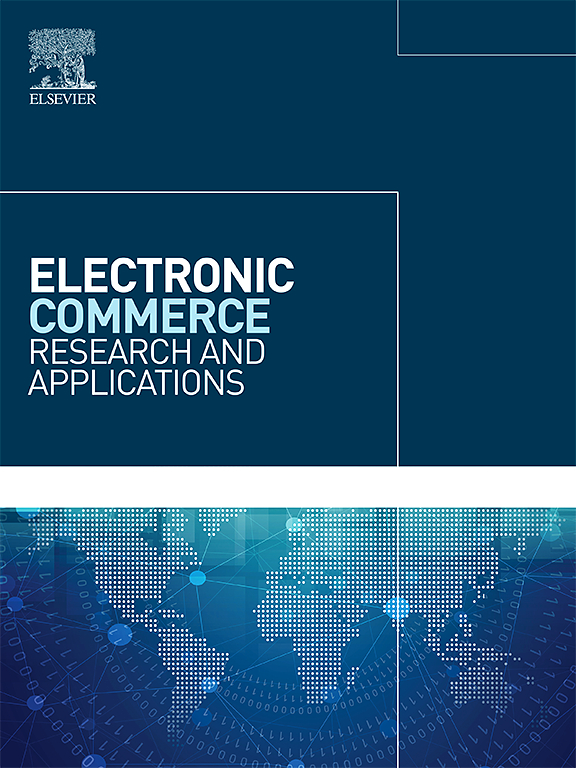“Domino effects on eWOM?” understanding consumers’ dynamic perceptions of online travel reviews and perceived travel risk: A three-stage longitudinal approach
IF 5.9
3区 管理学
Q1 BUSINESS
Electronic Commerce Research and Applications
Pub Date : 2025-06-21
DOI:10.1016/j.elerap.2025.101526
引用次数: 0
Abstract
Although the impact of the COVID-19 pandemic is gradually diminishing, its influence still persists through people’s experience of travel consumption, including travel risk perception and cautious information processing modes of online travel reviews (OTRs). Since the onset of COVID-19, literature has witnessed an upsurge in illuminating tourists’ intro-pandemic risk perceptions and information behaviors. However, from an evolutionary perspective, a whole spectrum to trace and compare the variations in tourist risk perception and OTR evaluation patterns over time remains unclear. Spanning three investigations pre-, during, and post-pandemic (in 2019, 2020, and 2023), results generally confirm that people’s perception of travel risk has undergone an inverted-U-shaped change, yet perceived equipment risk still maintains at a high level. Additionally, drawing upon the information adoption model (IAM), the results indicate that individuals increasingly consider the argument quality cues (informativeness, persuasiveness) and source credibility cues (expertise, trustworthiness, homophily) of online travel reviews as important over time. The dynamic relationships among different attributes of online travel reviews, perceived information usefulness, and perceived travel risk were also illuminated. Theoretically, findings of this study enriched our understanding of the dynamic role of IAM elements in predicting information usefulness and perceived travel risk in different phases of a public health crisis context. Practically, this study not only provides guidelines on post-pandemic risk management for tourism and hospitality managers, but also gives specific advice for travel websites to best optimize their marketing communication strategies through online reviews in alliance with different risk communication contexts.
“对eom的多米诺效应?”了解消费者对在线旅游评论的动态看法和感知的旅游风险:一个三阶段纵向方法
尽管新冠肺炎疫情的影响正在逐渐减弱,但其影响仍然存在于人们的旅游消费体验中,包括旅行风险感知和在线旅游评论(OTRs)的谨慎信息处理模式。自新冠肺炎疫情发生以来,有关阐释游客疫情引入风险认知和信息行为的文献激增。然而,从进化的角度来看,尚不清楚如何追踪和比较游客风险感知和OTR评估模式随时间的变化。在2019年、2020年和2023年的三次调查中,结果普遍证实,人们对旅行风险的感知经历了倒u型变化,但对装备风险的感知仍保持在较高水平。此外,根据信息采纳模型(IAM),结果表明,随着时间的推移,人们越来越重视在线旅游评论的论点质量线索(信息量、说服力)和来源可信度线索(专业知识、可信度、同质性)。分析了在线旅游评论不同属性、感知信息有用性和感知旅游风险之间的动态关系。从理论上讲,本研究的发现丰富了我们对IAM要素在公共卫生危机背景下不同阶段预测信息有用性和感知旅行风险中的动态作用的理解。实际上,本研究不仅为旅游和酒店管理人员提供了大流行后风险管理指南,而且还为旅游网站提供了具体建议,以便通过在线评论与不同的风险沟通环境相结合,最佳地优化其营销传播策略。
本文章由计算机程序翻译,如有差异,请以英文原文为准。
求助全文
约1分钟内获得全文
求助全文
来源期刊

Electronic Commerce Research and Applications
工程技术-计算机:跨学科应用
CiteScore
10.10
自引率
8.30%
发文量
97
审稿时长
63 days
期刊介绍:
Electronic Commerce Research and Applications aims to create and disseminate enduring knowledge for the fast-changing e-commerce environment. A major dilemma in e-commerce research is how to achieve a balance between the currency and the life span of knowledge.
Electronic Commerce Research and Applications will contribute to the establishment of a research community to create the knowledge, technology, theory, and applications for the development of electronic commerce. This is targeted at the intersection of technological potential and business aims.
 求助内容:
求助内容: 应助结果提醒方式:
应助结果提醒方式:


